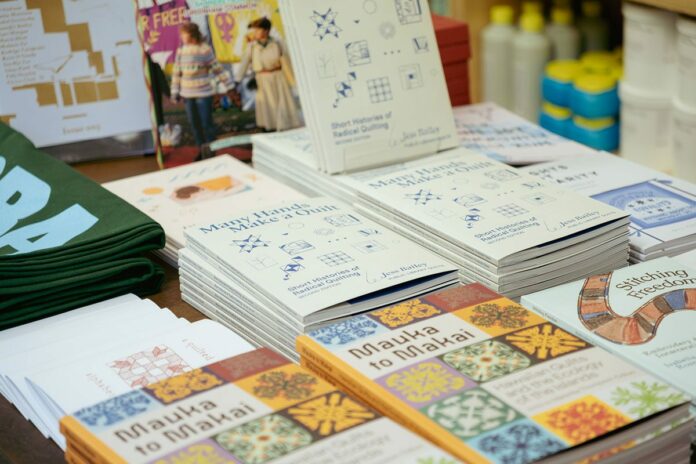“One thing that I’m sure a lot of other craft businesses feel as well is building that community of people is so important. If we were somehow stripped of our online community, we would really struggle, because we have people kind of flying our flag in their sewing bee, or in their knitting group. I’m so grateful for that community.”
Moseley, who says that they do very little marketing other than social media, mainly uses Instagram to spread the word about Common Threads and its new titles.
“The base of everything we do is actually through Instagram. I’ve built that platform over the last five and a half years, and we have people who buy every single publication, who have followed us for years and keep up with what we do. It’s really, really special, “she says. “And all of our publications are launched via Instagram and that’s how all of our authors have found out about us.”
Moseley notes that they also have a “wonderful distributor” who has helped them to get the books in museum shops and bookshops around the world. “We have a stockist in Japan,” she points out.
Common Threads pays their author royalties, but is also really proud of their fundraising efforts.
“It’s quite interesting to think that a small press based in a flat can raise thousands of pounds for a charity just through small booklets about craft,” Moseley says.
Common Threads’ latest title, Stitching the Intifada: Embroidery and Resistance in Palestine, will donate proceeds from the book to the Palestine Red Crescent Society. Even before the idea for the book was conceived, Common Threads raised one thousand British Pounds through an online talk by the author—curator, writer and art historian Rachel Dedman, who Common Threads approached following her successful UK exhibition Material Power: Palestinian Embroidery. “We had over 250 people sign up for this online event in March,” says Moseley. “We knew that our audience was interested in this history, and because the exhibition was in the UK, that people who weren’t based there really wanted to find out more about it. So we said to Rachel, ‘how about we turn the online talk you did for us into a small publication.’”
While the current challenge for Common Threads is deciding how to scale the business for longterm sustainability, “we’re kind of almost at this, like, slight tipping point where we’ve slightly outgrown our existing operation and we need to slightly upgrade our facilities and our methods,” she says, Moseley’s hopes for Common Threads are clear.
“I just hope that we can build a kind of archive, a big, repository of published works and research about histories of craft and that we can be kind of a central home to these histories,” she says, “And that I can look back and think, we have a whole library of really interesting books about craft that hopefully people can find inspiration in, find a home in, you know, see themselves in these histories that may otherwise be kind of retained to memory.” She ends, “It’s basically just to hopefully keep doing what we’re doing.”
